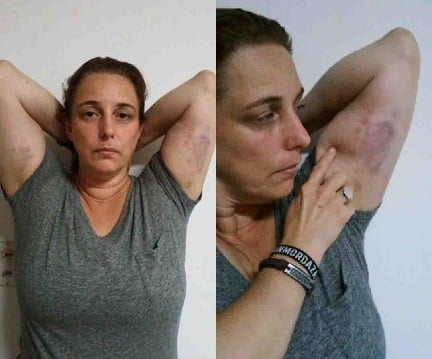People
Bruised During Latest Arrest, Tania Bruguera to Propose Free Speech Law
The bill would guarantee free speech and public assembly.

Photos via Facebook.
The bill would guarantee free speech and public assembly.

Brian Boucher

Dissident artist Tania Bruguera was arrested by Cuban authorities yet again on Sunday, after attending a protest staged by the Damas de Blanco, or Ladies in White. Photographs posted to her Yo También Exijo Facebook page show Bruguera displaying bruises on her arms that she apparently sustained during the arrest.
According to her sister Deborah Bruguera’s Facebook page, she was “pulled by her hair, forcefully thrown into a bus, and handcuffed.”
Bruguera’s latest arrest follows a previous detention by only a few days (see artnet News Exclusive: Tania Bruguera’s Arrest in Cuba Captured on Video).
The Ladies in White stage weekly protests calling for the release of loved ones imprisoned by the Cuban government. The group formed in response to a 2003 government crackdown, in which 75 dissidents, including 29 independent journalists, were arrested. The crackdown was staged during the US invasion of Iraq, ensuring that the world’s attention was focused elsewhere.
Sunday’s police raid on the Ladies in White involved more than 100 agents of the national police force, according to Deborah Bruguera, who reports that her sister was questioned about her May 20 performance involving a reading of Hannah Arendt’s book The Origins of Totalitarianism (see Tania Bruguera Challenges Cuban Government With Reading on Totalitarianism During Havana Biennial).
Bruguera was visiting the protest as part of her research for a bill she plans to propose, which would establish a right to public assembly and free speech. The bill would “penalize those who behave aggressively against those who have different political ideals,” said artnet News critic Christian Viveros-Fauné in a telephone interview.
“She is trying to get the state to pass a law that guarantees that the state itself will cease repressing both free expression and free assembly,” Viveros-Fauné added.